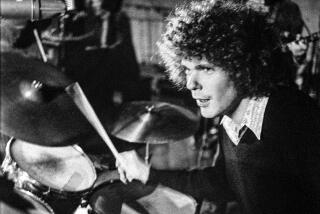A voice that carried
- Share via
Bear Family Records’ remarkable new release, “Let Me Be Your Sidetrack: The Influence of Jimmie Rodgers,” makes a persuasive argument that Rodgers is one of the most important figures in the history of country music.
According to the liner notes for the six-disc boxed set released last week, 102 of the 109 songs Rodgers did in the late 1920s and early 1930s were later recorded by other artists -- a 94% “cover ratio” unmatched by any other country singer-songwriter, including Hank Williams.
As the set’s more than 150 tracks demonstrate, Rodgers’ mix of traditional “hillbilly” music and the blues was a major influence not only on his contemporaries in country music but also on such other genres as folk, rock, jazz and even pop orchestras. Among the dozens of performers whose versions of Rodgers’ material are featured in the Bear Family compilation: Bob Dylan, Merle Haggard, Harry Belafonte, Jerry Lee Lewis, Johnny Cash, King Oliver and Pete Seeger.
Dylan, in fact, is such a fan that he helped put together a Rodgers tribute album in the late 1990s, featuring such artists as Bono, Alison Krauss, Steve Earle and Van Morrison offering interpretations of the singer’s work. In the liner notes for that album, which is included in this set, Dylan calls Rodgers one of the “guiding lights” of the 20th century. He adds, “His is the voice in the wilderness of your head . . . only in turning up the volume can we determine our own destiny.”
One of Rodgers’ most celebrated followers, Lefty Frizzell, might have just been the greatest vocal stylist in country music, and a few of his interpretations of Rodgers’ tunes are included in “Sidetrack.”
But Frizzell’s upbeat, honky-tonk singing approach, highlighted by a distinctive syllable-bending emphasis, is better showcased in another new CD from the German label.
Various Artists
“Let Me Be Your Sidetrack: The Influence of Jimmie Rodgers”
Bear Family Records (import)
The back story: Rodgers, who was born in Mississippi in 1897, was not only the first artist inducted into the Country Music Hall of Fame, but he was also a member of the first induction class at the Rock and Roll Hall of Fame.
Nicknamed the “Singing Brakeman” because he worked on the railroad for years before turning full time to music, Rodgers drew many of his stories from his own life. Unfortunately, his skyrocketing career was cut short by tuberculosis. He was so weak by the time of his last recording session in 1933 that he had to rest on a cot between songs. Rodgers died two days later.
The music: In addition to demonstrating the depth of Rodgers’ influence, the boxed set serves as a valuable guide to more than a half century of an important strain of American music. The first disc, which is devoted to Rodgers’ contemporaries, starts off by introducing us to an often overlooked country songwriter named Rex Griffin. He is remembered today as the writer of the mournful “The Last Letter,” but he also wrote such hits as “Everybody’s Trying to Be My Baby” (recorded by rockabilly star Carl Perkins and the Beatles) and “Just Call Me Lonesome” (recorded by country crooner Eddy Arnold).
In the first two discs, we also hear early recordings by such noteworthy Rodgers admirers as Gene Autry, Bill Monroe, Bob Wills and the Sons of the Pioneers. Disc 3 features artists in non-country genres as well as from other countries. Discs 4 and 5 consist mostly of country stars from the 1950s and 1960s, while the final disc features the recordings from the Dylan project, which was produced by Jeff Rosen and Jeff Kramer.
The overall set, produced by Richard Weize, is a marvelous reminder that Rodgers’ music is at the foundation of the rock ‘n’ roll revolution. Rodgers’ recordings are available in an excellent six-disc set from Bear Family or in a single disc compilation from RCA titled “The Essential Jimmie Rodgers.”
Lefty Frizzell
“Steppin’ Out”
Bear Family Records (import)
The music: Haggard has said that he saw a touch of the energy and sensuality of Elvis Presley in the young Frizzell, who enjoyed his greatest country music popularity in the early 1950s.
Frizzell’s entire recording output is available in “Life’s Like Poetry,” a 12-disc set from Bear Family, but this 35-track CD focuses on Frizzell’s high-energy side and illustrates Haggard’s point. Frizzell’s ability to combine desperate longing and cocky defiance in such tunes as “Cigarettes and Coffee Blues” and “She’s Gone, Gone, Gone” is flat-out awesome.
--
Backtracking is a monthly look at CD retrospectives and other pop items of historical interest.
More to Read
The biggest entertainment stories
Get our big stories about Hollywood, film, television, music, arts, culture and more right in your inbox as soon as they publish.
You may occasionally receive promotional content from the Los Angeles Times.










